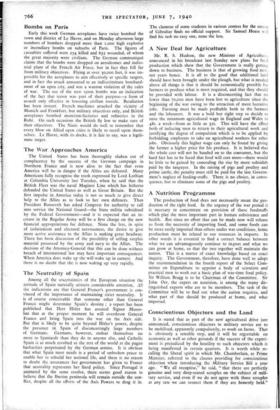A New Deal for Agriculture
Mr. R. S. Hudson, the new Minister of Agriculture, announced in his broadcast last Sunday new plans for food production which show that the Government is really getting down to business. The business is that of growing food now, not years hence. It is all to the good that additional land should have been brought under the plough, but what is needed above all things is that it should be economically possible for farmers to produce what is most required, and that they should be provided with labour. It is a disconcerting fact that no fewer than 70,000 men have been lost to agriculture since the beginning of the war owing to the attraction of more lucrative jobs. Farming must be made profitable both to the farmers and the labourers. It was a bold but right step to decide to raise the minimum agricultural wage in England and Wales to 48s. a week—from as little as 35s. This will have the effect both of inducing men to return to their agricultural work and justifying the degree of compulsion which is to be applied by forbidding employers to take on agricultural workers for other jobs. Obviously this higher wage can only be found by giving the farmer a higher price for his produce. It is believed that the whole cost will not be handed on to the consumer, but the hard fact has to be faced that food will cost more—there would be little to be gained by concealing the rise by more subsidies paid by the taxpayer. In the raising of pigs and poultry and prime cattle, the penalty must still be paid for the late Govern- ment's neglect of feeding-stuffs. There is no choice, in conse- quence, but to eliminate some of the pigs and poultry.


































 Previous page
Previous page